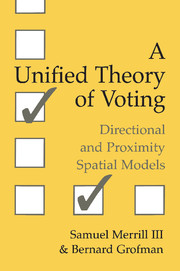Book contents
- Frontmatter
- Contents
- List of Tables and Figures
- Acknowledgments
- 1 Introduction
- Part I Models of Voter Behavior
- 2 Alternative Models of Issue Voting
- 3 A Unified Model of Issue Voting: Proximity, Direction, and Intensity
- 4 Comparing the Empirical Fit of the Directional and Proximity Models for Voter Utility Functions
- 5 Empirical Model Fitting Using the Unified Model: Voter Utility
- 6 Empirical Fitting of Probabilistic Models of Voter Choice in Two-Party Electorates
- 7 Empirical Fitting of Probabilistic Models of Voter Choice in Multiparty Electorates
- Part II Models of Party or Candidate Behavior and Strategy
- Postscript
- Appendices
- Glossary of Symbols
- References
- Index
7 - Empirical Fitting of Probabilistic Models of Voter Choice in Multiparty Electorates
Published online by Cambridge University Press: 04 December 2009
- Frontmatter
- Contents
- List of Tables and Figures
- Acknowledgments
- 1 Introduction
- Part I Models of Voter Behavior
- 2 Alternative Models of Issue Voting
- 3 A Unified Model of Issue Voting: Proximity, Direction, and Intensity
- 4 Comparing the Empirical Fit of the Directional and Proximity Models for Voter Utility Functions
- 5 Empirical Model Fitting Using the Unified Model: Voter Utility
- 6 Empirical Fitting of Probabilistic Models of Voter Choice in Two-Party Electorates
- 7 Empirical Fitting of Probabilistic Models of Voter Choice in Multiparty Electorates
- Part II Models of Party or Candidate Behavior and Strategy
- Postscript
- Appendices
- Glossary of Symbols
- References
- Index
Summary
The political parties created democracy and … modern democracy is unthinkable save in terms of the parties.
E. E. Schattschneider, Party Government (1942: 1)Multiparty Elections
In this chapter we fit the conditional logit model of voter choice developed in Chapter 6 – a model that involves both probabilistic voting and the effects of party identification – in the setting in which it is most appropriate: multiparty contests. For this we turn first to the multiparty parliamentary elections of Norway and Sweden, in which voting is for parties, seat assignment is by proportional representation, and party allegiance is relatively strong. Second, we study a presidential election in multiparty France, where voting is for candidates, not parties, and in which the electorate is characterized by more fluid party identification. Data are taken from the Norwegian Election Studies of 1985, 1989, and 1993, the Swedish Election Study of 1979, and the French Presidential Election Survey of 1988. Parameter estimation is by maximum likelihood, as outlined in Chapter 6.
In a multiparty election, deterministic models of voter choice, which assign all voters at a given spatial position to only one of the several parties, fit the data so poorly that discrimination between proximity and directional realizations of these models is unconvincing. By introducing into the model an unmeasured non-issue variable in the form of a probabilistic component, as well as incorporating a measure of partisan proclivity, we can obtain an adequate fit to the response data.
Information
- Type
- Chapter
- Information
- A Unified Theory of VotingDirectional and Proximity Spatial Models, pp. 91 - 106Publisher: Cambridge University PressPrint publication year: 1999
